
Isopoda is an order of crustacean, which includes woodlice and their relatives. Members of this group are called Isopods and include both terrestrial and aquatic species. All have rigid, segmented exoskeletons, two pairs of antennae, seven pairs of jointed limbs on the thorax, and five pairs of branching appendages on the abdomen that are used in respiration. Females brood their young in a pouch under their thorax.
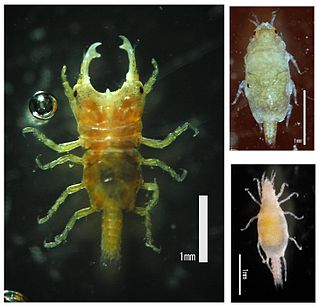
The Gnathiidae are a family of isopod crustaceans. They occur in a wide range of depths, from the littoral zone to the deep sea. The adults are associated with sponges and may not feed. The juvenile form is known as a 'praniza', and it is a temporary parasite of marine fish. These forms are not larvae; Gnathiidae instead become parasitic during the manca stage. Mancae of the Gnathiidae closely resemble the adult form, however they lack the final pair of pereiopods.

Sphaeromatidae is a family of isopods, often encountered on rocky shores and in shelf waters in temperate zones. The family includes almost 100 genera and 619 known marine species. Within these genera, there are groups that share distinctive morphologies; further research may reclassify these genus-groups as separate families.
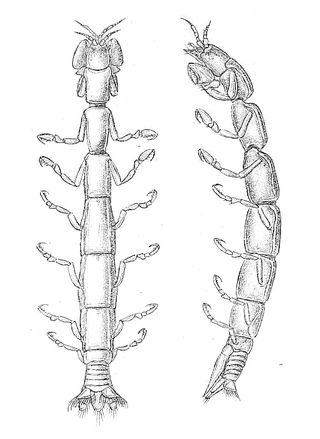
Anthuroidea is a superfamily of isopod crustaceans, formerly treated as a suborder, Anthuridea. The group is characterised by "an elongate cylindrical body form, without dorsal coxal plates, and with a uropodal exopod attached to the peduncle proximally and dorsally". There are more than 500 described species in 57 genera, arranged across six families:
Iais is a genus of isopod crustaceans. Iais species are found in association with larger isopods of the family Sphaeromatidae, usually on the ventral surface of the larger animal, between the pereiopods and on the pleopods. They are native to Australasia and South America, although Iais californica and its host Sphaeroma quoyanum have invaded California, and I. californica was first described from Sausalito, California. Nine species are recognised:

Idotea is a genus of isopod crustaceans, mostly from cold temperate waters. The taxonomy of the genus is still in doubt, and many of the currently recognised species may be taxonomic synonyms, and others may be moved to different genera.

The Idoteidae are a family of isopod crustaceans. It includes these genera:

Cymothoida is the name of a suborder of isopod crustaceans with a mostly carnivorous or parasitic lifestyle. It contains more than 2,700 described species in four superfamilies. Members of the suborder are characterised by their specialised mouthparts which include a mandible with a tooth-like process which is adapted for cutting or slicing.

Sphaeromatidea is a suborder of isopod crustaceans.
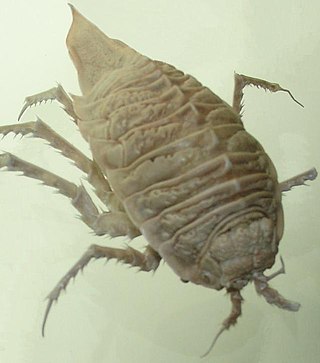
The Chaetiliidae are a family of isopod crustaceans in the suborder Valvifera, comprising these genera:

Saduria is a genus of benthic isopod crustaceans in the family Chaetiliidae, containing the following species:
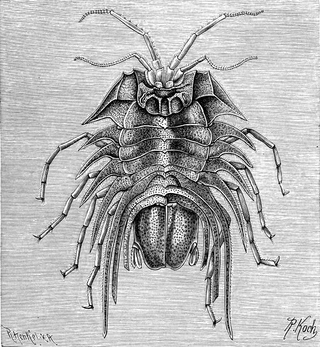
Serolidae is a family of isopod crustaceans, containing the following genera :

The Arcturidae are a family of marine isopod crustaceans in the suborder Valvifera. Members of the family resemble woodlice and are found globally in cooler areas in shallow seas.

Glyptonotus antarcticus is a benthic marine isopod crustacean in the suborder Valvifera. This relatively large isopod is found in the Southern Ocean around Antarctica. It was first described by James Eights in 1852 and the type locality is the South Shetland Islands.
Dynoides is a genus of isopod crustaceans in the family Sphaeromatidae, containing the following species:
Exosphaeroma is a genus of marine isopod of the family Sphaeromatidae. This genus is found in shallow ocean waters worldwide. It is notable for being one of the few genera of sphaeromatid to be found in the southern reaches of the Southern Ocean. The greatest diversity of Exosphaeroma occurs in the Southern Hemisphere.
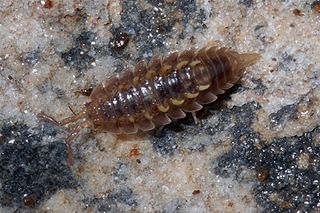
Deto is a genus of woodlice in the family Detonidae. Members of this genus can be found along the coasts in areas of New Zealand, Namibia, South Africa and Australia.
Euidotea is a genus of marine isopods belonging to the family Idoteidae. The species of this genus are found in Australia and New Zealand.
Holidoteidae is a family of marine isopods belonging to the suborder Valvifera.
Rectarcturidae is a family of marine isopods belonging to the suborder Valvifera.












